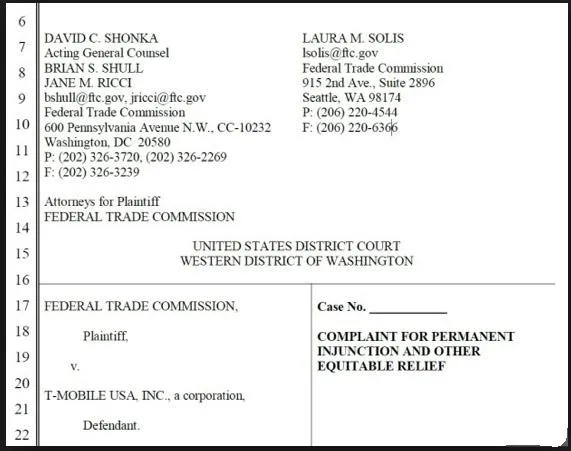CWA backs FTC on T-Mobile multimillion dollar fraud

The Federal Trade Commission (FTC) applied for a court order to stop T-Mobile from billing subscribers for unwanted spam text messages. The practice, known in the industry as “cramming,” provided between 35 and 40 percent of T-Mobile’s total billing income – hundreds of millions of dollars.
The charges were deeply hidden in customer bills. Said The Hill: “Customers would have to click through several screens online or scan through upwards of 50 pages of a physical bill to find obscure accounting for the third-party charges, the FTC said.”
In response, the Communications Workers of America issued the following statement:
CWA: ‘Un-carrier’ Bills Customers Hundreds of Millions of Dollars for Services They Never Ordered
Washington, D.C. – The Communications Workers of America isn’t surprised that T-Mobile US is being investigated by the Federal Trade Commission for cheating wireless customers and pocketing hundreds of millions of dollars.
CWA alerted parent company Deutsche Telekom in January 2013 that T-Mobile US managers were directing workers to add charges to customer accounts. Deutsche Telekom apparently ignored this warning.
Rather than address the underlying issues that incentivize cramming, in one case, the company blamed front-line employees who said they were working under direct orders from managers to cheat customers. These fired workers deserve to have their cases reviewed.
In June 2013, at a T-Mobile shareholder meeting, a CWA activist spoke directly to then Deutsche Telekom CEO Rene Obermann and T-Mobile CEO John Legere about T-Mobile cramming. This activist’s warning was also apparently ignored.
Now the FTC has stepped in and is suing T-Mobile US for cheating consumers.
T-Mobile US says it stopped billing for these Premium SMS services last year and has launched “a proactive program to provide full refunds for any customer that feels that they were charged for something they did not want.” Too bad that hundreds of thousands of customers couldn’t determine from their T-Mobile bill that they were the victims of fraud, because the “un-carrier’s” complicated billing practices made it nearly impossible for customers to determine that they were being cheated, according to the FTC. And consumers, mainly lower income families, who use pre-paid calling plans, do not receive monthly bills, so the fees were taken from their pre-paid accounts without their knowledge and consent. Will these customers also receive a “full refund?”
These third-party charges – often scams or entertainment sources – paid T-Mobile US as much as 40 percent of the monthly fees, the FTC complaint said. And even when it was made clear that charges were fraudulent, according to the FTC, T-Mobile US continued to illegally bill customers for the service.
Separately, the National Labor Relations Board also is investigating T-Mobile US for systemic violations of federal labor law. Complaints have been consolidated into one national case, which could lead to nation-wide remedies for the violations.
In addition to ignoring alerts about the “un-carrier’s” cramming, Deutsche Telekom also chose to ignore NLRB decision to pursue systematic abuse by T-Mobile US management. At the T-Mobile US annual meeting in April, DT voted its majority (67%) shares against a shareholder resolution that would have required human rights reporting; DT follows those principles in its operations in Germany.
CWA and the German union ver.di, which represents workers at DT and T-Mobile, are working to help T-Mobile US workers get the union representation they want. Thousands of T-Mobile workers in Germany have joined the campaign and have created partnerships with their U.S. counterparts, to convince DT that workers’ rights abuses at T-Mobile US must stop.
Feds accuse T-Mobile of massive scam (The Hill, Jul. 1, 2014)
CWA: ‘Un-carrier’ Bills Customers Hundreds of Millions of Dollars for Services They Never Ordered (CWA news release, Jul. 2, 2014)
FTC: T-Mobile Took Hundreds of Millions of Bogus Charges on Phone Bills (Gizmodo, Jul. 1, 2014)
CWA members oppose AT&T’s attempts to stop serving rural and low-income communities in California
CWA urges FCC to deny industry attempts to loosen pole attachment standards
CWA District 6 reaches agreement with AT&T Mobility



